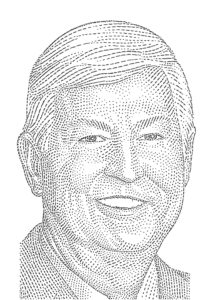NEW Series From Rick – The Most Important Lessons From My 50+ Years of Investing

Why would a stockbroker leave the office for lunch and end up spending the afternoon at a movie theater watching a Clint Eastwood triple feature? It’s hard to imagine a broker abandoning work in the middle of the trading day, but that broker was me. To understand what drove me into that darkened theater, you need to know what I was going through at the time—and how that experience contributed to one of the most important lessons I’ve learned during my 50+ year career in finance.
My fascination with the stock market began when I took my first investment class at Wharton Business School in 1967 during my MBA program. Investing was a new world to me (my father and grandfather weren’t investors—they both had pensions), and from that day on I wanted to learn as much as possible. I read investing books, followed the market’s movements in the newspaper and on TV, and listened to many so-called experts. It’s no surprise that this interest led me to a career in the investing world.
Along the way, though, I discovered that most of what you hear and read doesn’t teach you what you need to know to be a successful investor in the real world. Too often, investment “advice” is focused on specific products, like the stocks or mutual funds, or annuities, that someone wants you to buy. However, you can’t make sound investment decisions and manage your emotions without a grounding in the principles that lead to financial success. For me, I had to gain that knowledge through experience.
Some of those experiences were painful and humbling. Others were empowering. Now, more than 50 years into my journey to become a better investor, I want to share some of these stories and their lessons. I hope you can take something from my experiences to help put you on your path to investment success.
Investment class at Wharton—1966
A particular moment from my first investing class at the University of Pennsylvania made a big impression on me. One day, our professor asked us to calculate how much money we would have at retirement according to the following assumptions:
- We saved 10% of our starting salary the first year after graduation and continued saving 10% of our salary for the next 40 years
- Our salary would grow by 5% a year
- Our investments would earn 10% a year
I assumed a starting salary of $12,000 (which was a little optimistic—it turned out to be about $9,000), and then I began doing the math. We did not have computers back then, so I had to use manual calculations to work through all the figures. When I was done, I had an ending value of $1 million at age 64 in 2007.
I remember thinking this had to be a mistake. A million dollars was practically unheard of back then unless you were very wealthy.
I checked my work and got the same result. That’s when I realized that it was possible to become a millionaire by age 65 with a couple of reasonable assumptions—and a disciplined saving and investing strategy.
Lesson Learned: Compounding works wonders if you let it work.
Every retirement guide will tell you that starting to save early and keeping it up is the key to success. But it can be hard to stick with that approach because you must be willing to delay your gratification and ignore the noise around you – good and bad.
Investing doesn’t reward you consistently year after year. Some years you might not make much progress; other years, you might fall back a bit. Likewise, compounding isn’t exciting from one year to the next. Over long periods, though—like the 40 years you might spend saving for retirement—it’s going to make a big difference.
Clients and team members I work with have already experienced what compounding can do. They’ve been saving and investing for long enough that they can look back to where they were 20 years ago and be satisfied. Those of us in this fortunate position can help our younger friends and family members grasp the power of compounding.
When my granddaughters were around ten years old, I explained the Rule of 72 to them. It’s an easy way to quantify the benefits of compounding by calculating how long it takes for your savings to double. You divide the expected annual return of your investments into 72. For example, earning 10% per year means you’ll double your investments roughly every seven years, or six times over a 40-year career. And remember, compounding continues to work even after you retire—so your savings can double a few more times in your lifetime.
Check back each month for the next lesson from Rick Hill’s long view career.


